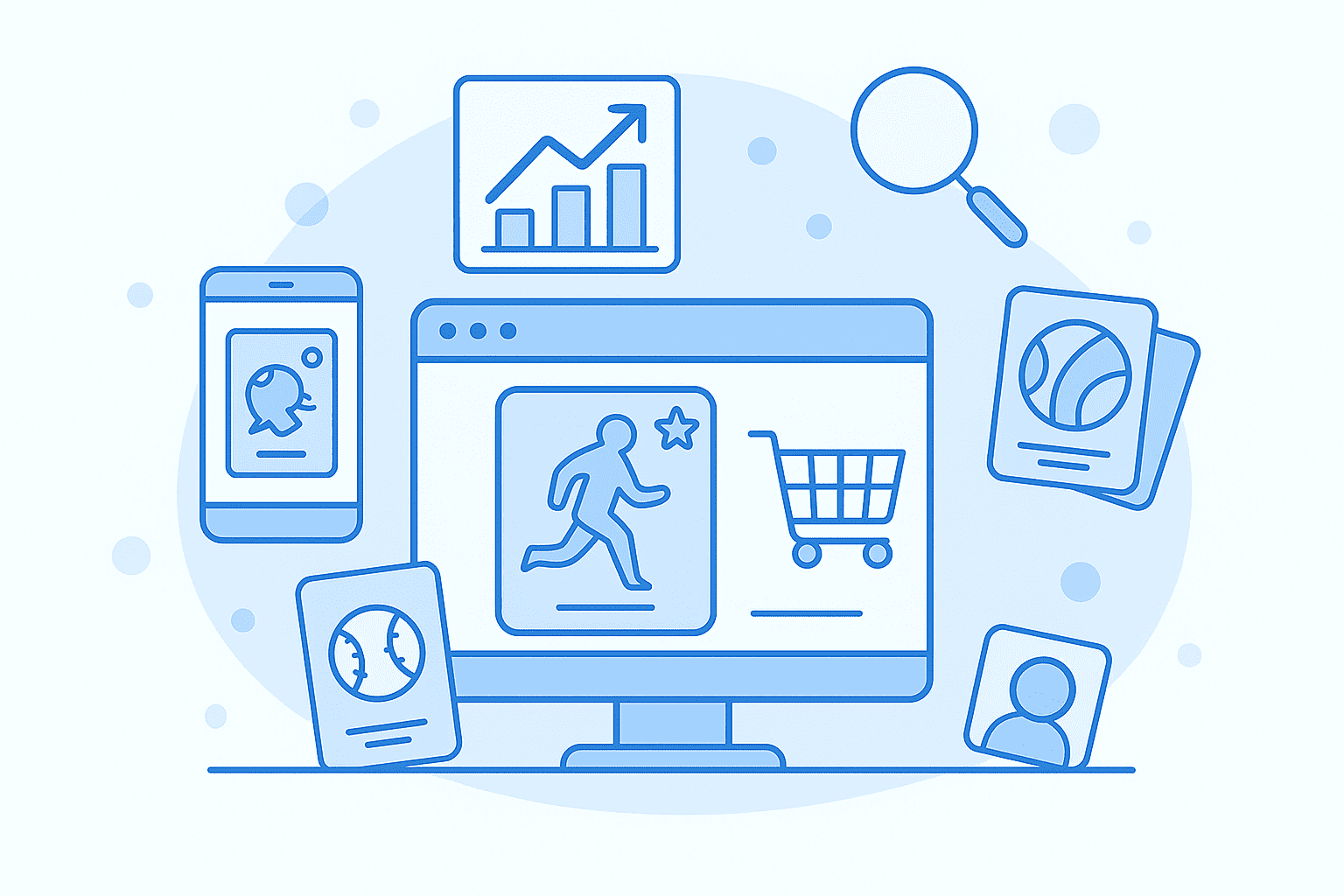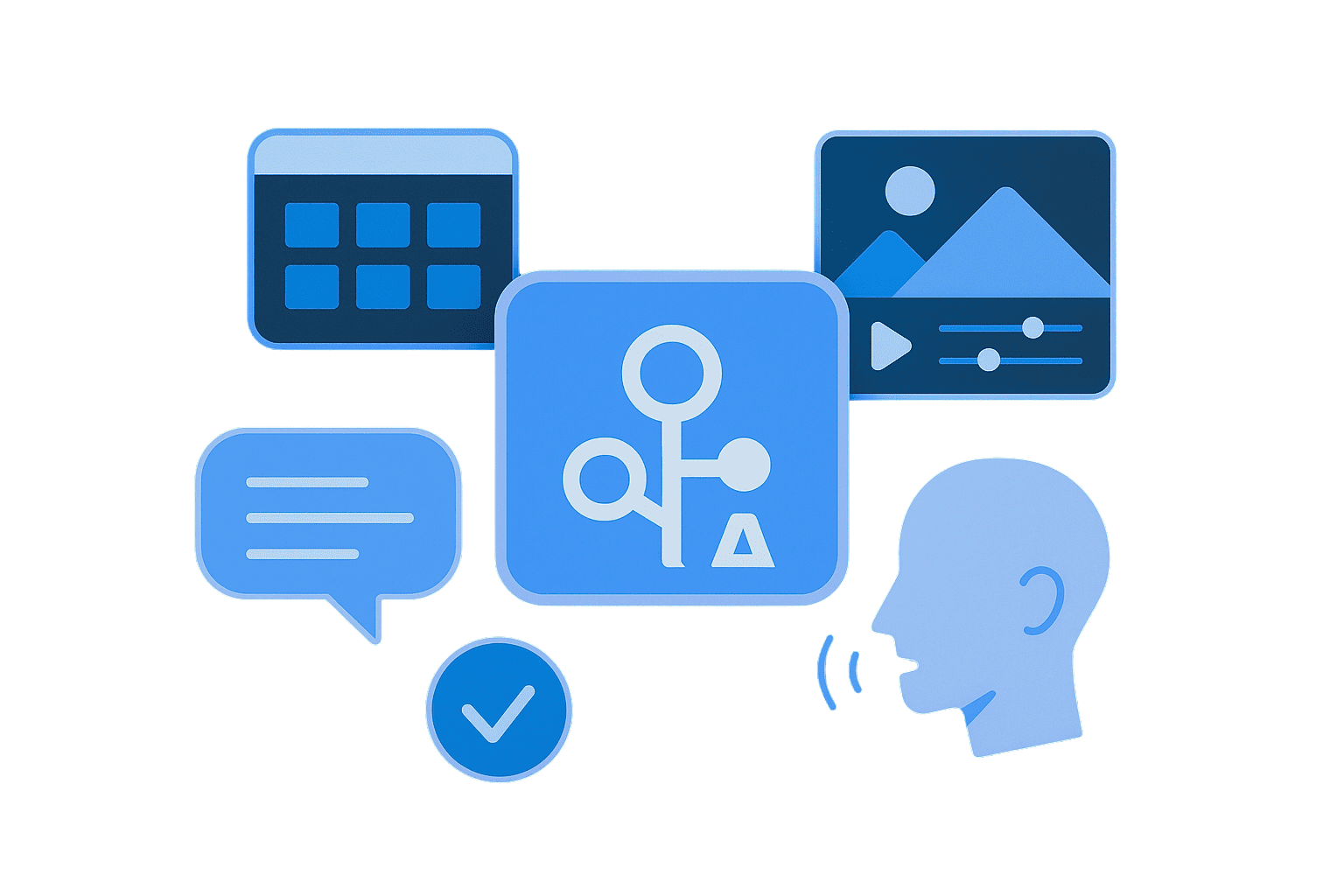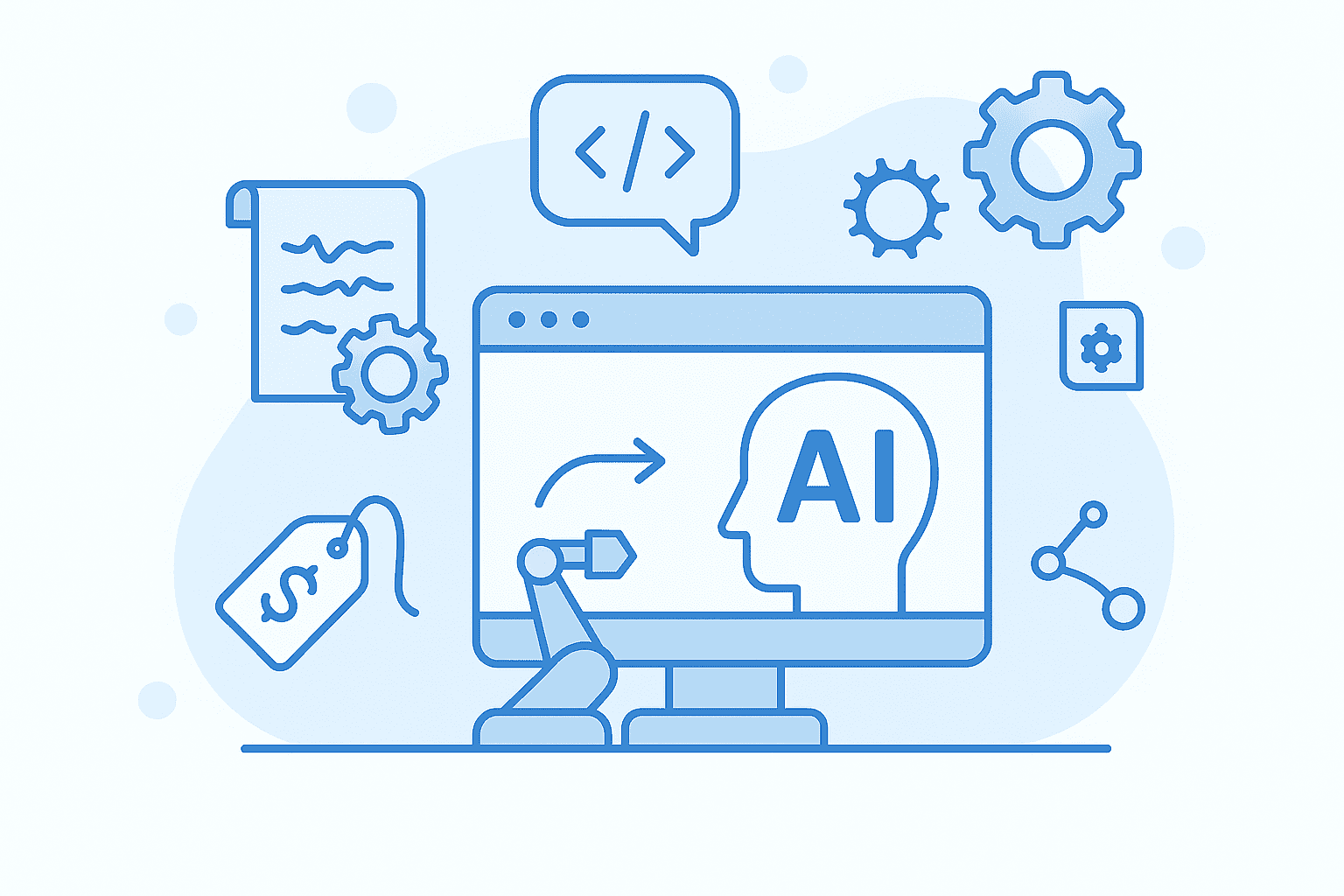What is a CRM?
CRM, or Customer Relationship Management software, focuses on the management and optimization of interactions with customers. It helps businesses track leads, manage customer communications, and build stronger client relationships across the sales journey. Key features include:
- Lead management across multiple channels
- Deal pipeline for tracking deals and activities
- Automated marketing campaigns and engagement tracking
A reliable CRM like the one powered by a robust Festi framework empowers small businesses with better customer retention, efficient communication, and increased sales.
What is ERP?
ERP stands for Enterprise Resource Planning software, which helps you systematize and integrate all the key business processes, from inventory to finance, HR, and even supply chain operations. While CRM deals only with customers, ERP helps to automate internal business processes. When small businesses reach such a capacity that they need to manage a great volume of data coming from different business sections, then ERP systems become inevitable.
Core functionalities include:
- Finance, expense tracking, and accounting
- Inventory optimization and supply chain management
- Human Resources, payroll, and personnel records
- Monitoring manufacturing and supply processes

A comprehensive ERP system from Festi can provide small businesses with modular all-in-one solutions that scale as they grow, enhancing decision-making and eliminating redundant processes.
ERP vs. CRM Differences at a Glance
| Aspect | ERP | CRM |
|---|
| Primary Function | Manages internal business processes | Manages customer relationships |
| Focus | Operations, finances, HR, supply chain | Sales, marketing, customer service |
| Main Users | Finance, operations, HR, supply chain departments | Sales, marketing, customer service teams |
| Benefits | Streamlined operations, integrated departments | Improved customer relationships, sales growth |
| Cost | Typically higher due to broader functionality | More affordable and specific to customer management |
| Implementation time | Longer due to the complexity | Faster, more straightforward setup |
Who Uses ERP & CRM Systems?
Different types of businesses rely on ERP and CRM systems for tailored solutions to their unique challenges. Here’s how small businesses in various industries benefit from these tools:
Retail & Wholesale
For small retailers, ERP is essential for inventory management and efficient order processing, helping optimize supplier relationships and stock levels. CRM systems keep track of loyalty programs and customer histories, allowing for personalized marketing and improved customer retention.
Automotive E-commerce
Automotive businesses increasingly turn to ERP and CRM systems to enhance online sales, improve customer engagement, and manage inventory across multiple locations. For instance, one of Festi’s clients—a startup founded by a car dealer in Illinois—needed a nationwide e-commerce platform to support dealerships nationwide. Their main challenge was the limited e-commerce functionality on standard dealership websites, which restricted customer engagement and online sales opportunities. Using Festi’s scalable framework, they transformed their platform into a comprehensive online store, enabling seamless transactions, real-time data analytics, and a more engaging customer experience. Learn more in this automotive e-commerce case study.
Healthcare
In healthcare, managing patient interactions and compliance requires precision. Festi’s Electronic Health Record System (EHR) integrates CRM for patient relationship management with ERP functionalities to support billing, inventory, and HR, enabling healthcare providers to deliver reliable, streamlined care.
Education (EdTech)
Educational institutions increasingly rely on ERP and CRM systems to manage student interactions, courses, and internal operations. Festi’sLearning Management System (LMS) helps institutions track student progress, streamline resource management, and scale as programs expand.
How to Decide if You Need ERP, CRM, or Both?
Choosing between ERP and CRM depends on your business's unique needs and challenges. Here are practical scenarios tailored to help you make the right choice based on your industry.
When to Use ERP
For businesses experiencing rapid growth and needing streamlined operations, ERP becomes essential. For example, retailers implementing ERP often see a 30% reduction in order processing times due to accurate inventory management and efficient workflows, leading to increased customer satisfaction.
Similarly, a healthcare provider using ERP for managing medical supplies reported a 50% improvement in order fulfillment and a 75% decrease in stockouts, enhancing reliability and client satisfaction.
When to Use CRM
A CRM system is crucial for businesses focused on expanding customer relationships. For instance, a real estate agency using CRM to organize client data and follow up on leads experienced higher closing rates and improved client satisfaction. Many retail companies also leverage CRM for real-time inventory updates, reducing customer inquiries by 30% and improving the overall shopping experience.
When to Use Both
Certain sectors, like manufacturing and IT consulting, benefit from the combined capabilities of ERP and CRM. For a manufacturing company, ERP optimizes inventory and production, while CRM handles client orders and service requests. Integrating both systems consolidates data, aiding in production planning and customer interactions. Festi's all-in-one platform enables this integration, allowing businesses to manage everything from client relationships to internal workflows in a single, customizable solution.
How Festi Can Help
Festi offers a tailored approach, allowing businesses to start with either ERP or CRM and scale as needed. Unlike rigid platforms, Festi provides fully customized ERP, CRM, and back-office solutions with no vendor lock-in, ensuring flexibility and data ownership.
Reach out to get a free demo to see how Festi’s custom business management software can drive growth across various industries.
How ERP & CRM Work Together
ERP and CRM development processes can address different internal and external organizational workflows, thus providing a complete solution. ERPs support the efficient execution of business activities, while CRMs ensure customer satisfaction. For small businesses, the benefits can be immense if the two products are integrated:
Enhanced Data Flow
Linking ERP and CRM systems enables the inter-department sharing of data. For instance, the sales team that uses CRM to manage customer orders can directly pull real-time ERP inventory data, allowing them to advise on more realistic and timely deliveries.
Comprehensive Customer Insights
Integrating CRM and ERP gives businesses a complete view of the customer journey across various stages, allowing for more personalized service and better customer experiences.
Gains in Performance
With ERP and CRM working together, businesses capture customer data, financials, and supply chain management details in one place, reducing the need for multiple systems, minimizing data entry errors, and improving cross-departmental communication.
This illustrates how the difference between CRM and ERP works to their mutual advantage. Festi's all-in-one platform allows small enterprises to horizontally integrate ERP and CRM without effort, making operations more effective and management decisions more straightforward.
How Festi Can Help
Festi offers a tailored approach, allowing businesses to start with either ERP or CRM and scale as needed. Unlike rigid platforms, Festi provides fully customized ERP, CRM, and back-office solutions with no vendor lock-in, ensuring flexibility and data ownership.
Reach out to get a free demo to see how Festi’s custom business management software can drive growth across various industries.
Which System is Better for Small Businesses?
Ultimately, it all depends on the business objective. The following classification will help you understand what may work best:
Consider ERP if:
- You manage multiple departments (finance, HR, marketing, operations) that need a unified, streamlined system.
- Inventory tracking and product delivery are challenging, and you need a better overview of stock and supply chains.
- Your business is expanding, and you need a solution that supports growth without requiring a significant increase in staff.
Consider CRM if:
- Sales and client relationships are your primary focus, and you must build customer loyalty.
- Lead tracking and client interactions need centralization to ensure timely follow-ups and personalized service.
- You aim to expand your customer base, and CRM can help retain and engage clients more effectively.
Thankfully, with Festi, you don’t need to be torn between the two. You can start with basic functionality and expand with new tools that are available with time upon deploying them in your other branches and across the scale of business.
Cost Comparison
The ultimate implementation cost depends on several parameters, such as the type of tasks and the scale of your business.
CRM Software Cost for Small Businesses
In most cases, businesses pay less for CRM software as it is more focused on performing fewer activities. CRM software cost for small businesses usually falls between $20 and $150 per user per month, depending on their operating levels. Moreover, other alternatives can be free or come at cheaper rates, especially for those with very few staff members.
Cost of ERP Implementation
The ERP cost is higher as tasks are performed over a more comprehensive range. The costs of ERP implementation in SMEs may range between $5,000 to $20,000, depending on the number of system users, designs, and additional modules, especially for the manufacturing sector. Moreover, ERP implementation takes the most time as the system will not accept all the data since it will interfere with the system processes.
Festi’s Scalable Pricing
With Festi, pricing is tailored to your specific business needs, enabling small and medium-sized companies to start with the essential features and scale up as they grow. This approach helps avoid unnecessary costs while ensuring you only pay for the tools that benefit your operations most. Contact us to get a free quote!
Use Cases: ERP vs. CRM for Small Businesses
Let’s now explore some of the real-life scenarios of how small businesses have practically applied ERP and CRM to power their processes and daily routines.
Billing System For IT Support Company
Our client, a US-based IT support company, encountered difficulties with a billing system that was both time-consuming and complicated. Their operations involved a lot of manual work across various platforms, such as CRM Connectwise and Excel, to estimate service costs, calculate taxes, and finalize client bills.
To tackle these challenges, we have created a custom billing solution with Festi’s custom admin and dashboard panels. This automated system simplified the entire process by handling data from Connectwise, exporting it to the accounting firm, and receiving tax calculations that were then integrated back into the CRM. Ultimately, bills were generated with precise tax and total calculations—all without any human involvement.
As a result, the CEO's time spent on billing was reduced from 24 hours to just 20 minutes. Moreover, the automation of sensitive data handling enabled the CEO to assign billing tasks to assistants without risking confidential information. This tailored billing system enhanced efficiency, reduced errors, and saved significant time, boosting the company’s operational productivity and security.
A System for Managing Employee Vacations
Our client required a system to handle employee vacations and company expenses, featuring integration, role-based access, and reporting capabilities. The initial estimate for developing this system with Spring Boot was 30 days, which put pressure on both the timeline and budget.
By utilizing Festi and the Data Grid Store (DGS), we were able to streamline the process and fulfill the client’s needs more effectively. DGS offered a strong component that allowed us to quickly create management screens and essential functionalities, including Google Workspace LDAP integration, ACL support, and custom vacation types, which significantly sped up development.
Thanks to Festi and DGS, we completed the entire system in just seven days, well below the original estimate. The client was pleased with the swift delivery, high quality, and considerable cost savings. Finishing the project quickly saved the client 87% of their anticipated budget, showcasing the efficiency and effectiveness of the Festi framework along with the powerful DGS component.
Embedded Development Project
This embedded project needed effective communication between devices and the backend to manage large-scale data collection. To accomplish this, the team used Festi Framework to develop a strong API, which facilitated smooth data exchange, scalability, and quick integration while keeping costs and development time low.
The Festi Data Grid Store (DGS) component offered crucial API endpoints and an intuitive CRUD interface, speeding up development and cutting costs. The framework was also adapted to support a mobile application, merging the backend and mobile API codebases for improved consistency and easier maintenance.
Moreover, Festi Async allowed for the development of a high-load Device Service RPC-API, which efficiently handled substantial data volumes, ensuring dependable communication between devices and the backend system. This strategy simplified development, boosted performance, and aligned with the project's goals for scalability and reliability.
By providing component-based architecture, Festi allows small companies to introduce only the necessary functions and scale later as they grow.
See other case studies to understand how Festi can be applied to your business.
Checklist for Choosing the Right System
It can be difficult to understand whether you should use ERP or customer relationship management software. The following list of questions will help you figure this out:
- Do you need to manage customer relations and track sales activities?
- Is expanding and retaining your customer base a top priority?
- Are inefficiencies in inventory, HR, or finance affecting your operations?
- Do you need a system that can scale as your business grows?
- Are your sales and operations teams struggling with data transparency and collaboration?
- Is tracking and analyzing customer interactions critical for enhancing satisfaction?
- Are you using multiple software tools that don’t integrate well, leading to data duplication?
- Would automating workflows save time, reduce errors, and boost productivity?
If you answered “yes” to three or more of these questions, an ERP or CRM system could address key needs across your business. Festi’s flexible platform lets youstart with ERP or CRM and add the other as your business evolves.
Common Pitfalls to Avoid
Deciding on the Cost Only
While upfront cost is important, avoid basing your choice on price alone. ERP and CRM systems are long-term investments, and the cheapest option may lack essential features. Consider long-term value and capabilities to make an informed decision.
Overlooking Scalability
Choose a system that can grow with your business. Investing in scalable solutions helps avoid costly upgrades or replacements as your needs evolve.
Paying for Unnecessary Features
Many systems offer feature-rich packages, but not all features may be relevant to your business. Start with essential tools, and add more as you grow to keep costs manageable and performance optimized.
Ignoring Integration Needs
Always ensure that the specific system you will use is in sync with your other existing tools so that you can avoid data silos and consequent inefficiencies.
Features to Look for in ERP & CRM
When evaluating ERP and CRM systems for your business, focus on these key attributes:
- Customization to your specific business processes and needs.
- Integration with existing tools like accounting or e-marketing systems.
- Scalability that allows adding modules and features as your business grows.
- Ease of use and user-friendliness, especially if training resources are limited.
Selecting an ERP or CRM system with these attributes will set your business up for growth, operational efficiency, and enhanced team productivity. Prioritizing customization, integration, scalability, and usability ensures your platform meets today’s needs while evolving with you.
Ready to Transform Your Business?
Choosing between ERP and CRM shouldn’t be complicated. By aligning your decision with your business goals, you’ll choose the best system, or a combination, that supports your vision. Whether you’re focusing on CRM’s customer-centric approach or ERP’s operational power, Festi provides solutions that grow with you.
Festi’s ERP and CRM solutions are designed to elevate your operations and customer engagement. Get a free demo and see how Festi can drive your business transformation!




